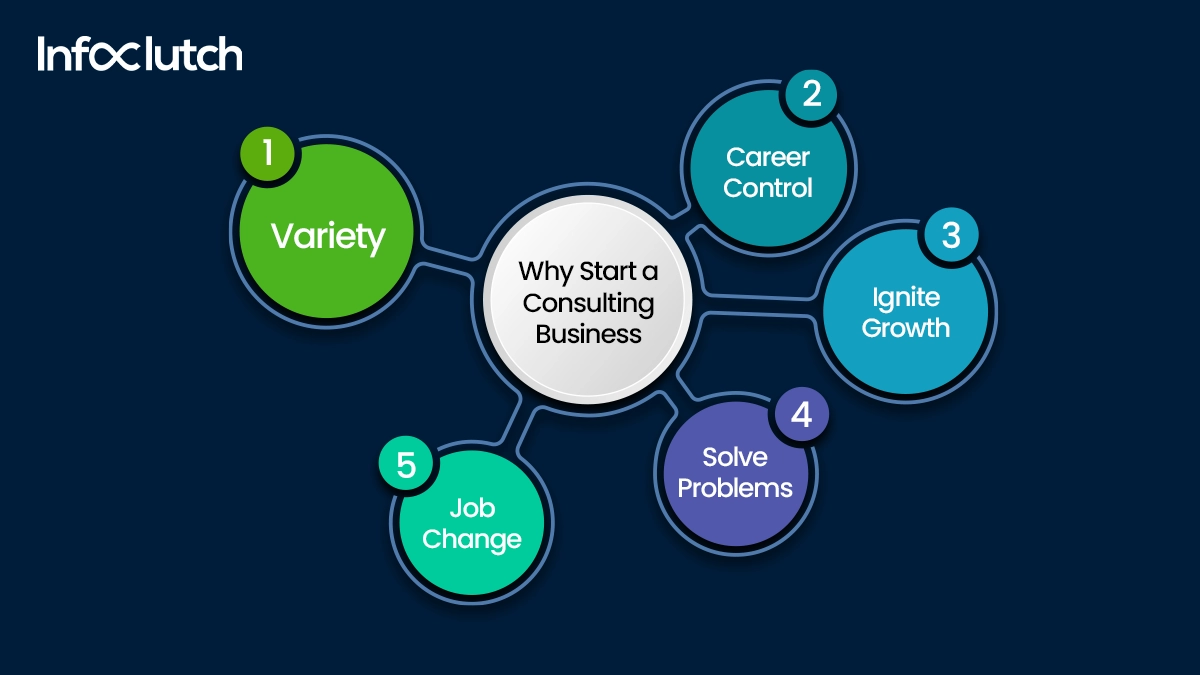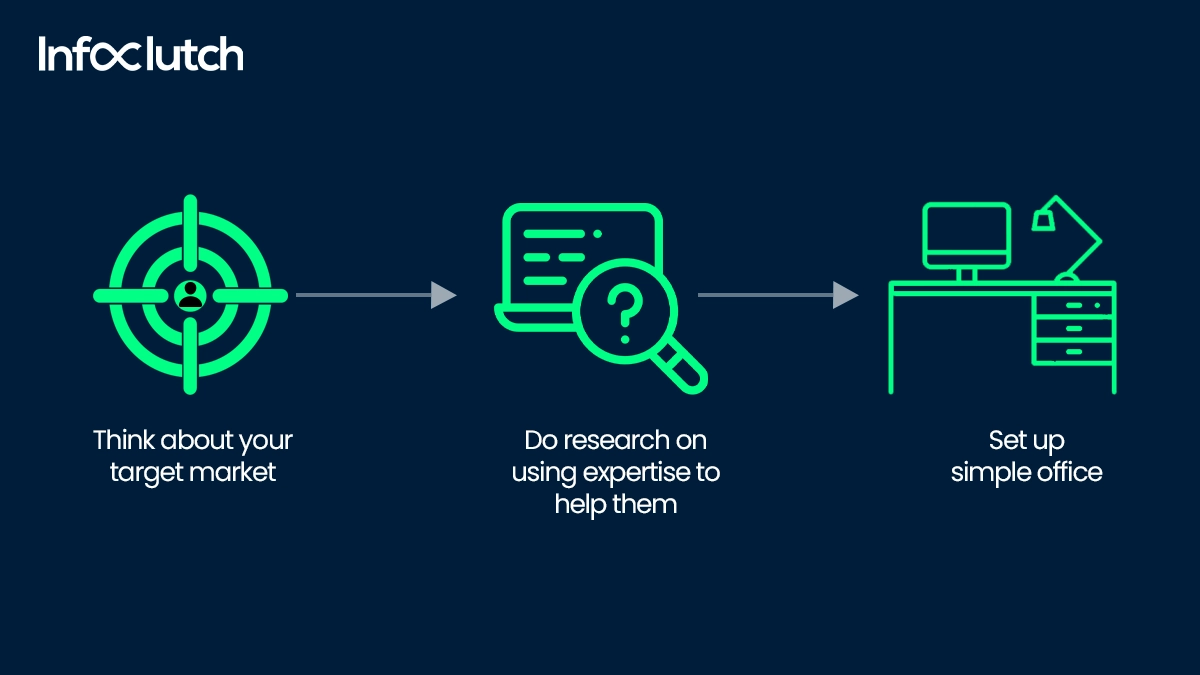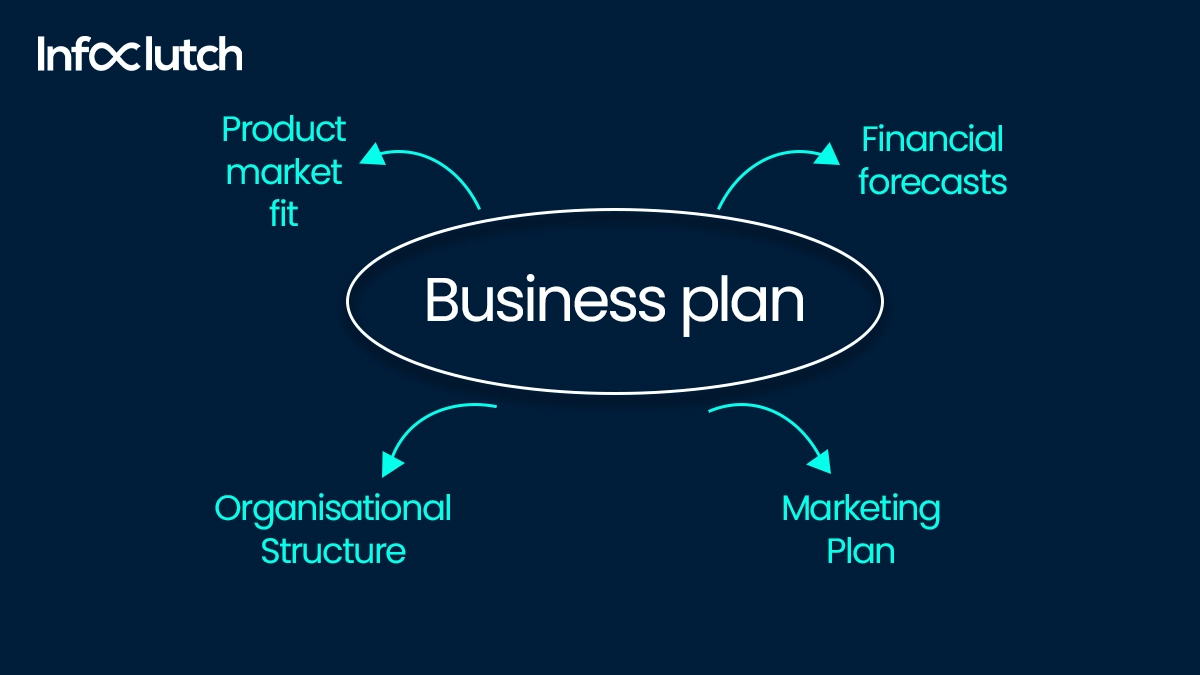In today’s ever-changing and competitive business landscape, consulting has emerged as a thriving industry, offering expert advice and solutions to individuals and organizations seeking to achieve their objectives efficiently and effectively. For the time being, Consulting Business Market size is expected to grow at a rate of 4.21% CAGR during the forecast period (2023-2028) from USD 321.52 billion in 2023 to USD 395.14 billion by 2028.
The journey to create a consulting business from scratch is fulfilling entrepreneurial endeavours if you are a long-serving, qualified professional with the power of knowledge and expertise in a specific field.

What is a Consulting Business?
When you start thinking about how to start a consulting business? First, you have to consider what a consulting business is. At its core, a consulting business provides specialized advice, guidance, and solutions to clients in various industries. As a consultant, you leverage your expertise, experience, and skills to help individuals, businesses, or organizations overcome challenges, optimize processes, and achieve their goals. Consulting services span various areas, including management, finance, marketing, human resources, technology, etc.
Why Start a Consulting Business For B2B?
Starting a consulting business for B2B offers numerous advantages and opportunities for individuals seeking independence, professional growth, and the chance to make a meaningful impact. Here are some compelling reasons why many professionals choose to venture into the consulting world:

- Capitalizing on Expertise: Consultants are subject matter experts in their respective fields, and starting a consulting business allows them to leverage their knowledge to assist others. Sharing insights and providing solutions based on years of experience can be personally rewarding and beneficial to clients.
- Flexibility and Autonomy: You can schedule and choose the projects you want as a consultant. This flexibility enables a better work-life balance and empowers you to focus on areas that align with your passions and interests.
- Diverse Clientele: Consultants often work with clients from various industries and sectors, exposing them to challenges and opportunities. This diversity enriches their professional experience and provides constant learning opportunities.
- Impactful Contributions: Consultants play a vital role in shaping the success of their client’s businesses or projects. By providing valuable advice and strategic direction, they can witness tangible results and the positive impact of their contributions.
- Potential for Lucrative Earnings: Established consultants with quality word of mouth and consistently delivering results often command premium service fees. As the demand for specialized expertise increases, consultants can earn a considerable income.
Overview of the Consulting Industry for B2B and Its Potential for Growth
Where and how to start a consulting business for B2B? It is vital to learn about what governs that consulting industry. The consulting industry for B2B has experienced remarkable growth in recent years, driven by rapid technological advancements, evolving market dynamics, and the need for specialized knowledge in an increasingly complex business environment. According to industry reports, the global management consulting market will reach significant revenue figures in the coming years.
Here are the reasons why;
- The key driver of this growth is the rising demand for strategic guidance and operational optimization across various sectors.
- Large and small businesses recognize the value of seeking external expertise to gain a competitive edge, enhance efficiency, and adapt to changing market conditions.
- The increasing prevalence of digital transformation, data analytics, and artificial intelligence has created new opportunities for consultants to offer cutting-edge cyber security, digital marketing, and business intelligence solutions.
- The trend towards remote work and virtual collaboration has expanded the reach of consulting services, allowing consultants to serve clients globally without geographical constraints.
Starting a consulting business for B2B presents many opportunities for aspiring entrepreneurs with specialized expertise and a passion for making a positive impact. By understanding the essence of consulting, recognizing its advantages, and acknowledging the industry’s growth potential, you can embark on your consulting journey confidently and purposefully.
The following sections of this comprehensive guide will delve into the essential steps and considerations required to build a renowned consulting business that brings value to you and your clients.
How to Start a Consulting Business: Key Steps and Statistics for Aspiring Entrepreneurs

As the consulting industry thrives, it offers promising opportunities for aspiring entrepreneurs seeking independence, flexibility, and the potential for lucrative earnings. To launch a successful consulting business, accompanied by relevant statistics highlighting the industry’s growth and potential.
Let’s find out the various steps on how to start your consulting business:
- Identifying Your Consulting Niche
- Researching the Market Demand
- Creating a solid business plan
- Leveraging digital marketing
- Networking and Building Relationship
- Offering Value and Demonstrating Expertise
- Emphasizing Personal Branding
- Acquiring Testimonials and Referrals
· Identifying Your Consulting Niche:
The first step to starting a consulting business is identifying your expertise or niche. Clear focus enhances your market positioning and client attraction in management, finance, marketing, technology, or human resources. According to a survey by Edelman Intelligence, 47% of consultants believe specialization in a specific industry or skill set is critical for success in the consulting business.

· Researching the Market Demand:
Before diving into the consulting world, it’s crucial to research. Analyze industry trends, identify pain points faced by potential clients, and study the existing competition in your chosen niche. According to Statista, the global management consulting market is expanded vigorously to reach $270 billion in 2022, indicating a robust demand for consulting services.
The numbers are sufficient evidence that starting a consulting service will become a successful endeavour. As mentioned earlier, before starting substantial research is paramount; studying the target audience is the highest quality research that a B2B data from renowned sources can provide and ensure to invest in a top-notch email list for researching the market demand.
· Creating a Solid Business Plan:
Crafting a well-thought-out business plan is fundamental to the success of your consulting business. It is a roadmap outlining your goals, target market, pricing strategy, and marketing approach. The Small Business Administration reports that entrepreneurs with a business plan are twice as likely to succeed compared to those without one.

· Leveraging Digital Marketing:
The digital age requires a solid online presence, which is vital for attracting clients and showcasing your expertise. Building a professional consulting website, utilizing social media platforms, and implementing content marketing strategies can significantly impact your visibility. According to HubSpot, companies that publish blog posts generate 67% more monthly leads than those that don’t.
· Networking and Building Relationships:
Networking plays a pivotal role in the consulting industry. Attend industry events, conferences, and networking meetups to leverage your connection with potential clients and build relationships with fellow professionals. The Harvard Business Review states that approximately 85% of all jobs are filled through networking, emphasizing the significance of personal connections in the consulting world.

· Offering Value and Demonstrating Expertise:
Clients seek consultants who can deliver tangible value and results. Offer free webinars, workshops, or downloadable resources to showcase your expertise and problem-solving capabilities. According to a report by Nielsen, 83% of consumers trust what friends and family recommend, while 66% trust consumer opinions posted online. You must build credibility and trust among potential clients by providing valuable content and case studies.
· Emphasizing Personal Branding:
Personal branding is a powerful tool for differentiating yourself from competitors in the consulting industry. Invest in crafting a compelling personal brand that reflects your values, expertise, and unique selling proposition. According to LinkedIn, 77% of marketers agree that branding is critical for business growth.
· Acquiring Testimonials and Referrals:
Positive feedback from satisfied clients is a potent marketing tool. Request testimonials from past clients and encourage referrals to showcase your credibility and the quality of your services. According to BrightLocal, 91% of consumers depend on online reviews and testimonials as much as personal recommendations.
Remember that demonstrating expertise, personal branding, and gathering positive testimonials are essential for building credibility and attracting clients. The consulting industry’s growth and potential present many opportunities for aspiring entrepreneurs seeking a rewarding and impactful career path. With the right approach and perseverance, your consulting business can thrive and make a significant difference in your client’s lives.
What Steps Must Be Taken To Protect Consulting Business?
Again when you are planning How to start a consulting business, Legal and Administrative Considerations must be in the plan of action.
- Choose the proper business structure that aligns with your goals, such as sole proprietorship, limited liability company (LLC), or partnership.
- Register your consulting business and obtain any necessary permits or licenses in your locality.
- Financial systems and accounting practices to manage your finances effectively—secure business insurance to protect yourself and your consulting business from unforeseen risks.
Two Major Factors That Must Be Prioritized Once You Have Established Consulting Service;
Delivering Exceptional Consulting Services
- Your success as a consultant hinges on delivering exceptional services to your clients. Focus on building strong client relationships through effective communication and understanding their needs.
- Develop methodologies and best practices that align with your consulting niche and ensure tangible client results. Learn to manage client expectations and handle any challenges during the consulting process. Be open to feedback and continuously improve your services to maintain a high standard of excellence.
Scaling and Expanding Your Consulting Business
- As your consulting business grows, consider scaling and expanding your services. Explore opportunities to hire and manage a team of consultants to extend your reach and capacity.
- Diversify your service offerings to cater to different client needs and expand your client base. Consider exploring new markets or industries to broaden your consulting opportunities.
Conclusion
Learning how to start a consulting business and beginning a consulting business can be an enriching entrepreneurial journey. By identifying your niche, creating a solid business plan, handling legal considerations, building your brand, attracting clients, and delivering exceptional services, you can lay a strong foundation for success. Remember that growth and scalability come with continuous learning, adaptation, and a commitment to providing value to your clients. As you embark on your consulting venture, stay true to your expertise, embrace challenges, and remain passionate about positively impacting your clients’ businesses and lives. Your consulting business can thrive and create a lasting legacy with determination and perseverance.





